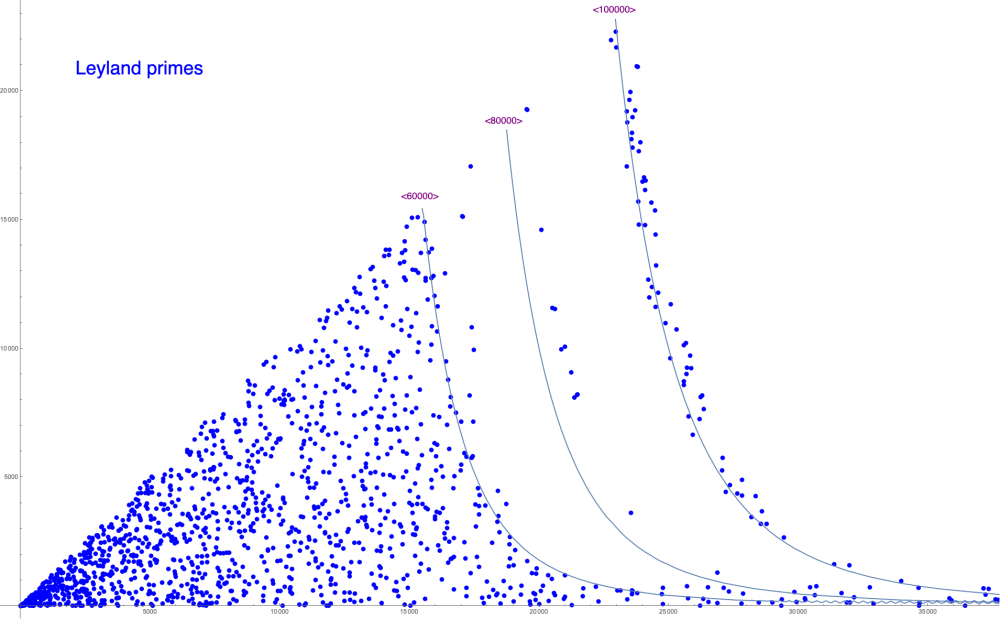| Currently there may be errors shown on top of a page, because of a missing Wiki update (PHP version and extension DPL3). |
| Topics | Help • Register • News • History • How to • Sequences statistics • Template prototypes |
Difference between revisions of "Leyland number"
m |
m |
||
| Line 9: | Line 9: | ||
==Data== | ==Data== | ||
| − | The data tables contains for every number the x and y values, the number of digits, the Leyland number<ref>[https://www.mersenneforum.org/showpost.php?p=521992&postcount=263 Leyland number] by [[Hans Havermann ]]</ref>, dates and persons of finding and | + | The data tables contains for every number the x and y values, the number of digits, the Leyland number<ref>[https://www.mersenneforum.org/showpost.php?p=521992&postcount=263 Leyland number] by [[Hans Havermann ]]</ref>, dates and persons of finding and proving if available and the program used to prove a prime. |
===Leyland numbers=== | ===Leyland numbers=== | ||
| − | There are <b>{{Num|{{#expr | + | There are <b>{{Num|{{#expr:{{PAGESINCATEGORY:Leyland prime P|pages|R}}-2}}}}</b> numbers: [[:Category:Leyland_prime_P_proven|{{Num|{{PAGESINCATEGORY:Leyland prime P proven|pages|R}}}} proven primes]] and [[:Category:Leyland prime P PRP|{{Num|{{PAGESINCATEGORY:Leyland prime P PRP|pages|R}}}} probable primes]]. |
*[[:Category:Leyland prime P|Category]] | *[[:Category:Leyland prime P|Category]] | ||
*[[Leyland_prime_P_table|Table]] | *[[Leyland_prime_P_table|Table]] | ||
Revision as of 10:43, 5 August 2019
A Leyland number is a number that can be expressed in the form [math]\displaystyle{ x^y+y^x }[/math], where x and y are positive integers with the condition 1 < x ≤ y. These numbers are named after Paul Leyland, who first studied these numbers in 1994. The first few nontrivial Leyland numbers are given by OEIS sequence A076980.
A Leyland prime is a Leyland number which is also a prime (see sequence A094133 in OEIS).
The second kind of numbers are of the form [math]\displaystyle{ x^y-y^x }[/math].
Contents
History
Data
The data tables contains for every number the x and y values, the number of digits, the Leyland number[1], dates and persons of finding and proving if available and the program used to prove a prime.
Leyland numbers
There are 1,814 numbers: 307 proven primes and 1,507 probable primes.
Leyland numbers second kind
Reservation history
- x=20001-40000, y=11-200 completed by Serge Batalov, 2014-05-03
- x=15001-20000, y=1001-2000 completed by Serge Batalov, 2014-05-14
- x=40001-330000, y=11-17 completed by Serge Batalov, 2014-05-16
- x=330001-400000, y=11-17 completed by Serge Batalov, 2014-05-17
- x=400001-500000, y=11-17 completed by Serge Batalov, 2014-05-19
- x=20001-30000, y=801-1000 reserved by Dylan Delgado, 2019-07-24
Contribution of Leyland numbers
This graph can be found here:
References
External links
- Leyland number
- Main thread of XYYXF Project at MersenneForum
- Current search for Leyland PRP's at MersenneForum
- Prime proofs of Leyland numbers at MersenneForum
- Homepage of Paul Leyland
- Page of Leyland numbers, dated 2006-10-06 by P.Leyland
- Homepage of Andrey Kulsha, dated 2017-01-04
- Yahoo group, 2005 to 2016
- sequence A061119 in OEIS of n^2 + 2^n
- sequence A253471 in OEIS of n^3 + 3^n
- YouTube "Leyland Numbers - Numberphile"
| General numbers |
| Special numbers |
|
| Prime numbers |
|
